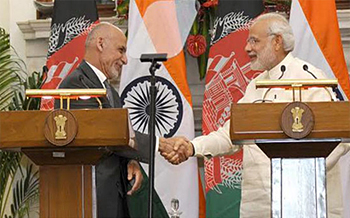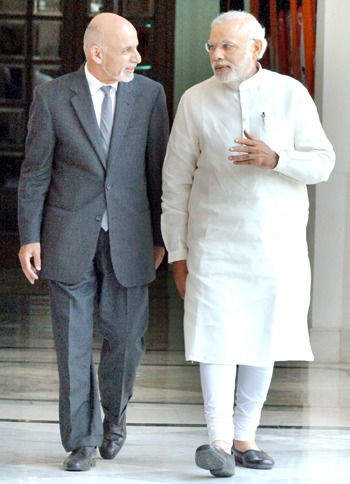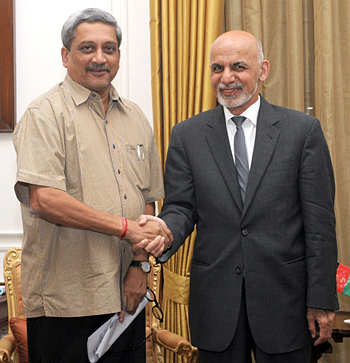INDIAN ARMED FORCES CHIEFS ON OUR RELENTLESS AND FOCUSED PUBLISHING EFFORTS

The insightful articles, inspiring narrations and analytical perspectives presented by the Editorial Team, establish an alluring connect with the reader. My compliments and best wishes to SP Guide Publications.

"Over the past 60 years, the growth of SP Guide Publications has mirrored the rising stature of Indian Navy. Its well-researched and informative magazines on Defence and Aerospace sector have served to shape an educated opinion of our military personnel, policy makers and the public alike. I wish SP's Publication team continued success, fair winds and following seas in all future endeavour!"

Since, its inception in 1964, SP Guide Publications has consistently demonstrated commitment to high-quality journalism in the aerospace and defence sectors, earning a well-deserved reputation as Asia's largest media house in this domain. I wish SP Guide Publications continued success in its pursuit of excellence.
- Operation Sindoor: Resolute yet Restrained
- India’s Operation Sindoor Sends a Clear Message to Terror and the World – ‘ZERO TOLERANCE’
- Japan and India set forth a defence cooperation consultancy framework, talks on tank and jet engines
- Terrorist Attack in Pahalgam in Kashmir: Unfolding a long surgical war against PAK
- Lt General Pratik Sharma takes over Command of Indian Army's Northern Command
The Afghan Conundrum
Armed feuds have broken out after the government warned of a growing IS influence in the country, with the Afghan government also considering options to assist the re-raising of guerrilla forces in the country to take on both the Taliban and the IS.
 |
By Lt. General P.C. Katoch (Retd) Former Director General of Information Systems, Indian Army |



The ISIS is on a winning streak in the Middle East having captured Ramadi and Palmyra recently. But what should cause serious concern closer home is that according to US sources, the ISIS has partnered with a rogue organization called ‘The Hiig” which is assisting them in planning a hostile takeover of Afghanistan, and that the ISIS has reportedly taken control of five provinces in northern Afghanistan, as also now controls a drug trade channel in southern Afghanistan. It is apparent that the ISIS will go for the mineral rich areas of Afghanistan, especially the Lithium producing belt and pockets, similar to its objectives of oil fields of the Middle East. There are also some reports about the Afghan government arming Talban fighters to confront the ISIS. When President Ashraf Ghani delayed his visit to India because of the Taliban attack in Kunduz, it portrayed the irony in Afghanistan; the launch of the summer offensive by the Taliban with obvious Pakistani support. Much was said about Ashraf Ghani visiting India seven months after becoming President, his first foreign being China and in Pakistan going to the army headquarters to meet the Pakistani army chief overlooking protocol. But then, isn’t he justified considering Afghanistan has to face the brunt of the Pakistani army and her proxies? Then, considering that his predecessor, Hamid Karzai, made 20 trips to Pakistan as in his 13 years of Presidency to try and broker peace, Ghani must have contemplated doing something different. After all, Prime Minister Vajpayee too travelled all the way by bus to Lahore. It is a different issue that Nawaz Sharif was the Prime Minister of Pakistan and is so now – as gag political head of a country whose military has no plans to stop generating terrorism. Violence has increased exponentially in Afghanistan, what with Pakistan apparently having free hand in her proxy war. On 13 May, Taliban attacked Kabul’s expat hub killing 14 people including four Indians, two Italians and an American.
During the visit of Ashraf Ghani to India, both countries called on the international community to severely deal with the safe havens for terrorists.
As per Afghan intelligence, the target was to be the Indian Ambassador to Afghanistan who was supposed to attend a function at the expat hub. In another recent incident in Farah Province of Western Afghanistan, ongoing clashes between the Taliban and ISIS left 27 killed and 20 injured. Armed feuds have broken out after the government warned of a growing IS influence in the country, with the Afghan government also considering options to assist the re-raising of guerrilla forces in the country to take on both the Taliban and the IS.
The Islamic State, although yet to find a firmer footing in the country, have been actively recruiting manpower from Afghanistan. The trend is dangerous for both the government, who will have to deal with radicalized social elements, and the Taliban, who are losing more of their members to the highly successful group. During the visit of Ashraf Ghani to India, both countries called on the international community to severely deal with the safe havens for terrorists that continue to threaten regional and global security and welcomed the recent decision of the US President to extend the draw-down of US troops till the end of 2016.
Foreign Minister Sushma Swaraj recently reiterated that “India is committed to assisting Afghanistan in its quest to become an independent, peaceful and prosperous country”.
The India Afghanistan Strategic Partnership Agreement of 2011 spans: one, political and security cooperation; two, trade and economic cooperation; three, capacity development and education, and; social, cultural, civil society and people-to-people relations. The implementation of this agreement is being done under framework of a Partnership Council headed by Foreign Ministers of both countries. This agreement can be regarded as a game changer in the region. The uncertainties and impediments need monitoring, challenge being to restore the currently derailed negotiations amongst stakeholders and ensure peace in Afghanistan. However, the dynamics of this strategic partnership would be affected by the political and security environment in Afghanistan, most importantly the deviousness of Pakistan. Foreign Minister Sushma Swaraj recently reiterated that “India is committed to assisting Afghanistan in its quest to become an independent, peaceful and prosperous country”. India has a shared interest in the success of an Afghan-led and Afghan-owned process of reconciliation. Prime Minister Modi said “this should be conducted within the framework of the Constitution of Afghanistan, without the shadow of violence. It should reinforce the political, economic and social progress of the last fourteen years. And, it should protect the rights and aspirations of all sections of the society, including Afghan women." But then Mr Modi also added that the success of this process requires a positive and constructive approach from neighbours, including an end to support for violence. For the time being, President Ashraf Ghani appears to have put all his weight behind Pakistan.
An MoU has been signed between Pakistan’s ISI and Afghan intelligence albeit the Afghan National Unity Government has called for scrapping it. Meanwhile China has hosted talks with an Afghan Taliban, with ISI representative in attendance in a bid to facilitate Taliban talks with the Afghan government. But the question here is will Afghanistan’s rogue neighbor, Pakistan, play ball. Present indications do not point towards such possibility. Therefore, very rightly India is fast-tracking development of the Chabahar route that will allow access to Afghanistan as well as Central Asia, also permitting tapping of energy resources.





